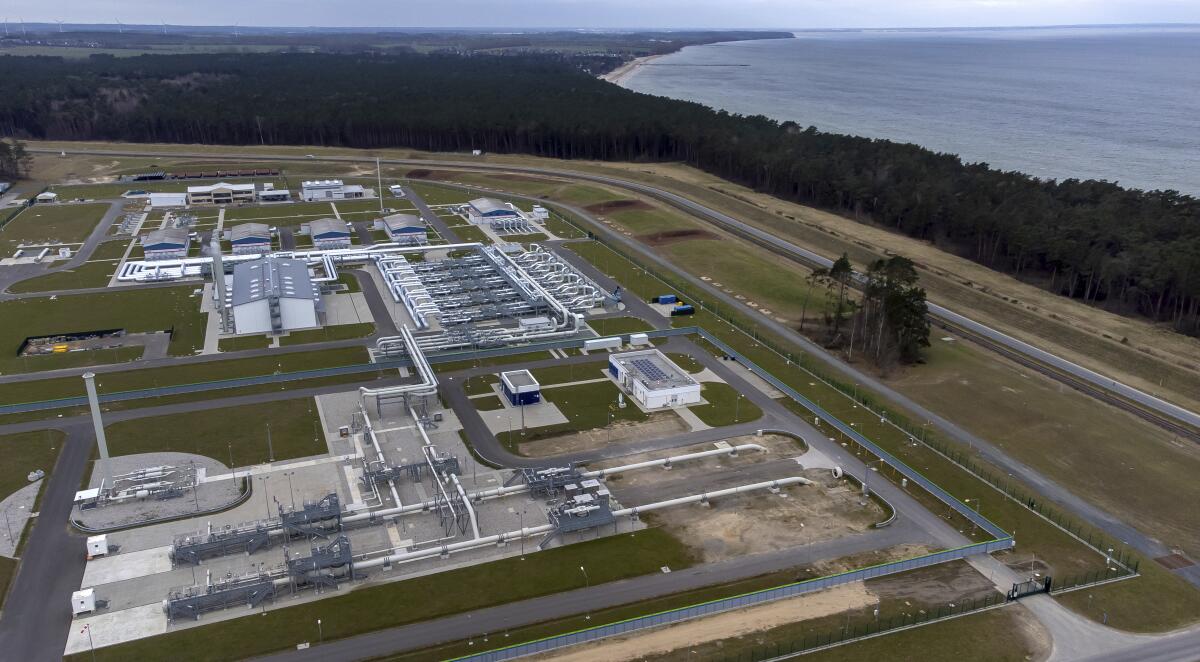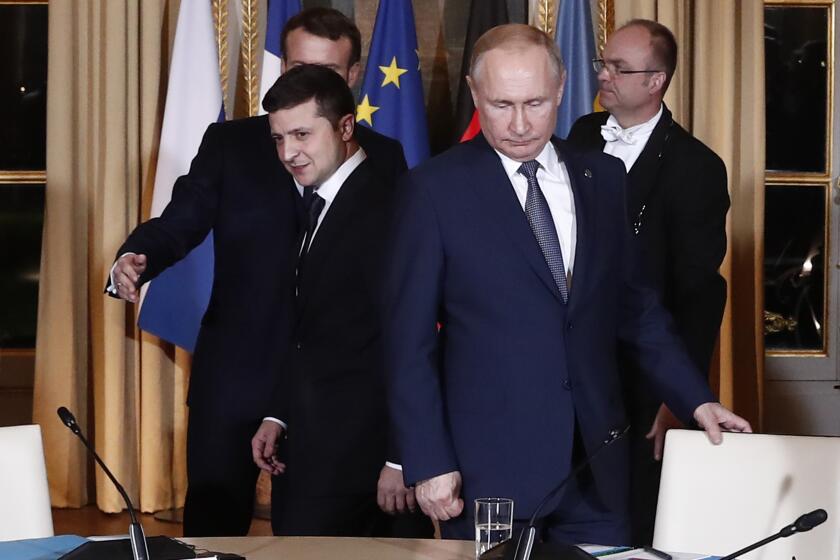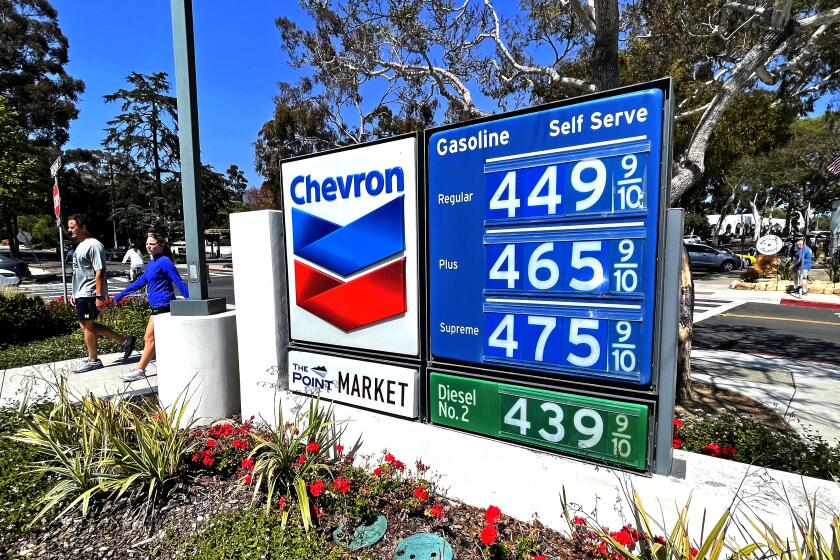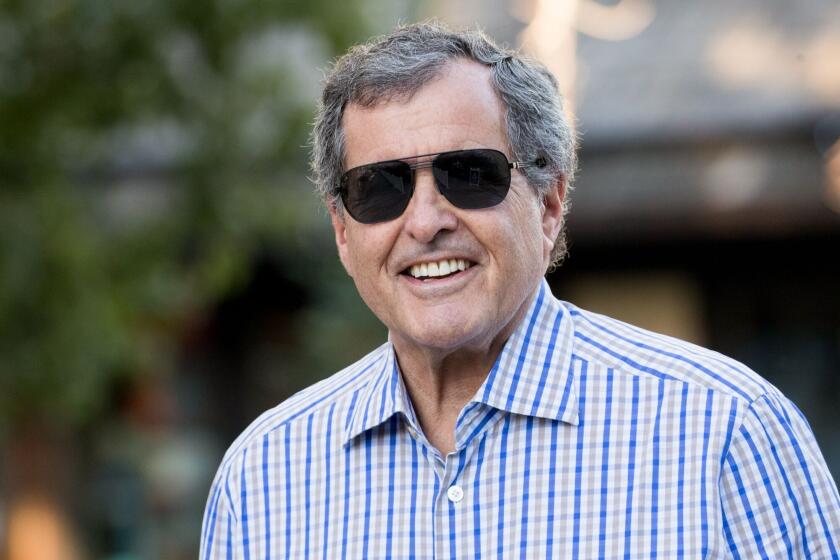Big Oil walks away after decades in Russia

- Share via
First BP, then Shell. In just two days, Britain’s twin energy giants have dumped Russian investments nurtured over decades and shut themselves out of the world’s largest energy exporter, probably forever.
Shell’s move to exit a stake in the Sakhalin-2 LNG project, an investment that dates back to the Boris Yeltsin era, follows BP’s announcement on Sunday that it will walk away from a holding in Russia’s state oil producer, Rosneft. Their decisions put pressure on remaining foreign investors, including Exxon Mobil and France’s TotalEnergies, to follow suit as Russia’s war in Ukraine forces a dramatic rupture with the global economy.
The departures will be quickly felt on both sides. Russia’s state energy companies will lose partners that brought capital alongside commercial and technical expertise, while BP and Shell will write down billions of dollars in the value of their investments. The moves also mark the end of a longer story: Big Oil’s quest for riches in the post-Soviet energy industry, which offered access to some of the world’s largest and most lucrative reservoirs.
In the chaotic years after the fall of the Soviet Union, executives including BP’s then-chief executive, John Browne, sought profitable deals with a weak Russian state. Before Russia first signaled its rift with international norms by annexing Crimea in 2014, Shell was talking about expanding Sakhalin, BP plotted joint ventures with its new partner Rosneft and Exxon planned one of its largest-ever investments to drill in Russia’s Arctic Ocean. Those ambitions, already curtailed by existing economic sanctions and the industry’s emphasis on cash over growth, are now history.
Russia, supplier of about 10% of the world’s oil and more than 15% of its gas, will increasingly be going it alone.
“Overnight, Russia has lost Western partnerships it took decades to build,” said Ahmed Mehdi, analyst at Renaissance Energy Advisors, a consulting firm.
Gov. Newsom calls on state pension funds CalPERS and CalSTRS, as well as the UC Retirement System, to divest Russian assets over the war in Ukraine.
Shell, the United Kingdom’s most valuable company, first got involved in the Sakhalin project to develop gas reserves in Russia’s remote Far East in the early 1990s. After being forced to sell a 50% share to Russia’s state-run Gazprom in 2006 — Putin’s government was unhappy with the easy terms won from the Yeltsin administration — the more than $20-billion project, built to withstand the brutal Russian winter, started shipping gas to customers in Asia in 2009.
Although Shell only had a 27.5% stake in the project, it was still key to the operations, leading the development and operation of Russia’s first liquefied natural gas project. For years, it campaigned for permission to expand the plant, but it hadn’t persuaded Moscow before the Crimea crisis ended the prospect of new investments in oil and gas.
U.S. and its allies have held off on taking the toughest sanction against Russia over Ukraine, worried about risks of political and economic blowback.
“Our decision to exit is one we take with conviction,” Shell CEO Ben van Beurden said when announcing his decision to walk away. “We cannot — and we will not — stand by.”
Exxon, yet to say anything about the future of its Russian business, operates the nearby Sakhalin-1 project, which started exporting oil in 2006. The executive who led Exxon’s investment was Rex Tillerson, who later became CEO and then-President Donald Trump’s first secretary of state.
A big proponent of Russia’s potential, Tillerson had staked the oil giant’s growth strategy of developing giant production projects with Rosneft in Russia’s Arctic Ocean. Like Sakhalin-2’s expansion, those plans were stymied by sanctions imposed after the annexation of Crimea, but Exxon had been willing to commit tens of billions of dollars in capital.
The financial sanctions on Russia are vast and unprecedented. Here’s how they work.
BP had an even deeper involvement in Russia than either Shell or Exxon. After an initial venture faltered, the British giant founded TNK-BP with a group of billionaires in 2003, creating one of the country’s largest oil producers and making BP Russia’s biggest foreign investor. In 2013, it sold out to Rosneft, getting $12.5 billion in cash and a 19.75% stake. At the time, then-CEO Bob Dudley said the deal “gives us a wonderful opportunity to forge a new partnership with a great Russian oil company.”
Dudley was still on Rosneft’s board until Sunday, as was his successor in the CEO suite at BP, Bernard Looney. They both resigned from the board, with Looney adding that the war in Ukraine “has caused us to fundamentally rethink BP’s position with Rosneft.”
BP may be able to sell its stake in Rosneft back to the Russian explorer at a huge discount, according to people familiar with the matter. Otherwise, both BP and Shell have indicated they might just have to walk away. Equinor, Norway’s largest oil producer, has also said it will exit all its Russian business.
Will gas and food prices continue to rise? How might the conflict in Eastern Europe affect Silicon Valley and Hollywood?
“For a lot of these companies, they’ve invested a lot of time and focus and capital, and now one sees the end of that 30-year period where what people labored over hard is just coming to a screeching halt,” said Jonathan Elkind, senior research scholar at the Center on Global Energy Policy and a former official in the U.S. Energy Department.
Attention will now turn to TotalEnergies. The French company is unique in developing a new Russia project even after the imposition of post-Crimea sanctions. It’s a partner in Yamal LNG, an export project on Russia’s frigid north coast that started shipments in 2017.
More recently, Russia has attracted foreign capital to help finance the development of new oil fields. Since late 2020, traders Vitol and Trafigura have both become partners in Vostok Oil, a venture to develop a swathe of untapped Siberian reserves. Neither has said what they plan to with their stakes.
“Is this the end of the line for Western energy majors in Russia?” Elkind said. “It certainly marks the end of one big, long cycle.”
More to Read
Inside the business of entertainment
The Wide Shot brings you news, analysis and insights on everything from streaming wars to production — and what it all means for the future.
You may occasionally receive promotional content from the Los Angeles Times.













